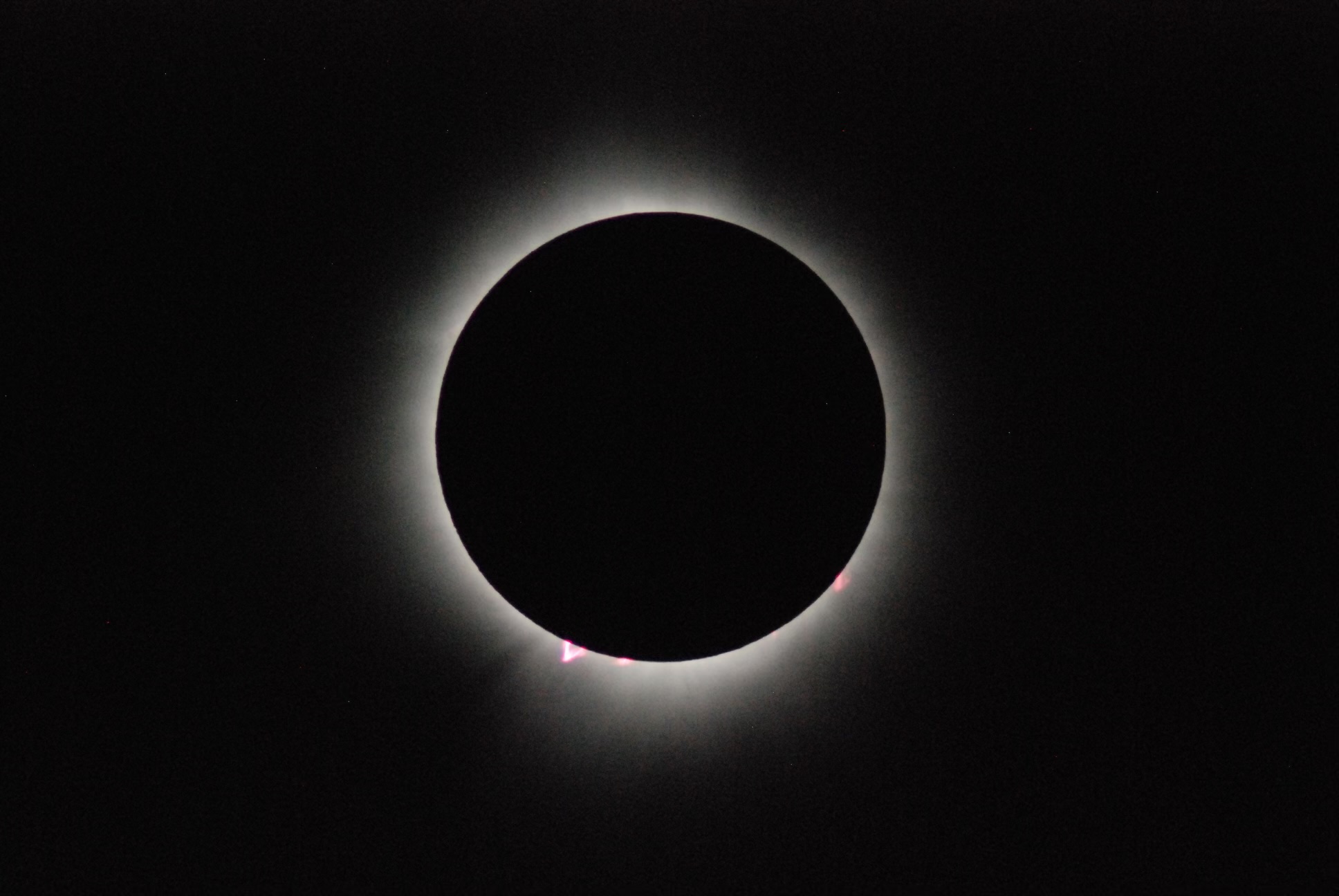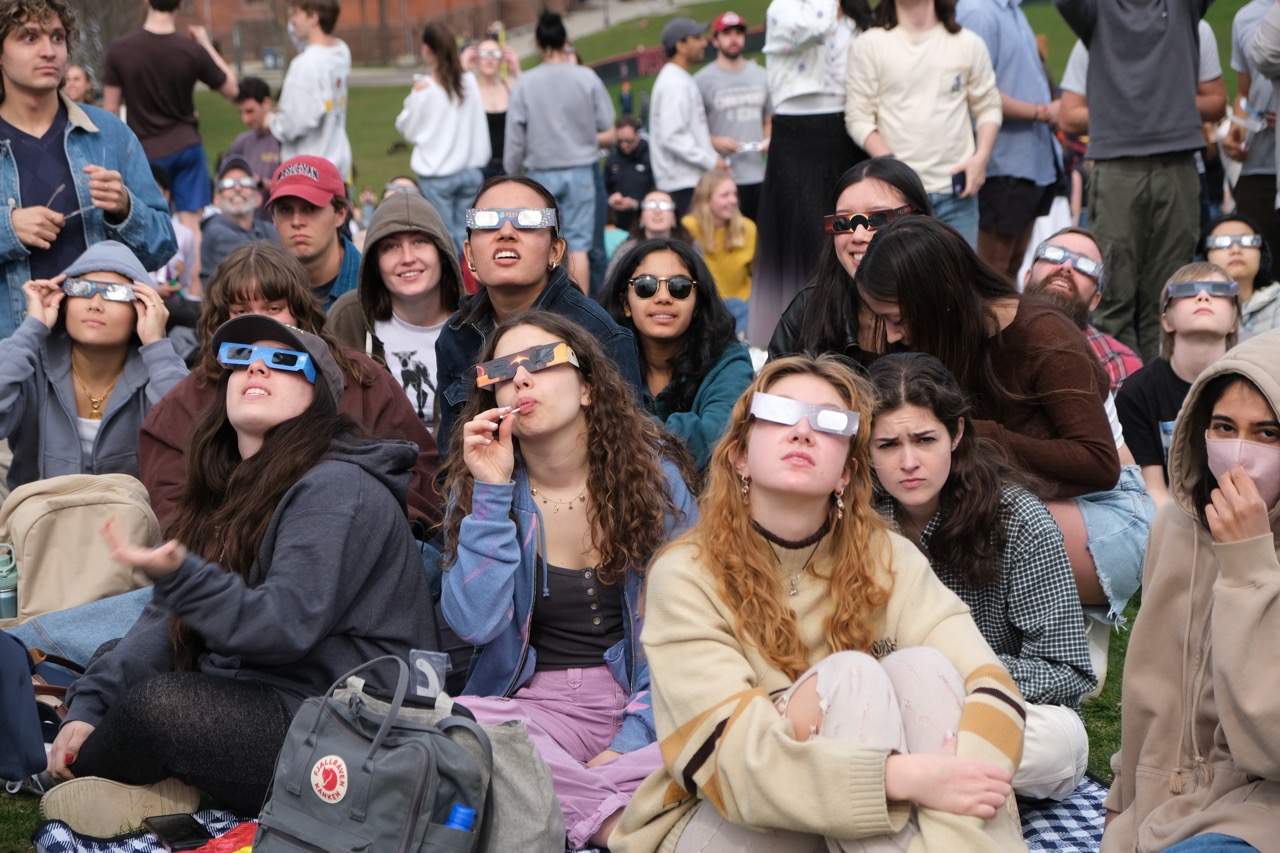
c/o Uday Narayanan
Over 1000 people gathered on Foss Hill on the afternoon of Monday, April 8 to watch the Great North American Eclipse, which traced a path of totality across 13 U.S. states. From the Middletown vantage point, the moon obscured approximately 92% of the sun during the eclipse’s maximum coverage, at 3:27 pm. Students in the University’s physics and astronomy departments traveled to Maine to view the eclipse in totality, while a volunteer group of astronomy majors led by Azmain Nisak ’23 MA ’24 led eclipse programming on campus.
“We got hundreds of calls every day in the last couple of weeks asking about the event,” volunteer and astronomy major Victoria Dozer ’24 said. “It’s really exciting because we don’t get to do stuff like this at the observatory every day.”
This eclipse was widely anticipated, as the last total solar eclipse to be visible from the contiguous United States occurred in 2017. Another full eclipse will not be visible from the U.S. until 2044. The lunar shadow also passed over more cities and densely populated areas than it did in 2017, with an estimated 31.6 million people living in the path of totality and an additional 150 million within 200 miles of the path.
“We’ve been planning this event for about a year with our partners at Russell Library,” Chair of the Astronomy Department Meredith Hughes said. “They worked with us to get most of the eclipse glasses that we had available for the community on [April 8] through a NASA program for bringing eclipse materials and glasses to local libraries.”
 The event on campus featured not only the free eclipse glasses obtained through the NASA@My Library project and the STAR Library Network, but also an indoor planetarium, a live stream of NASA TV with path-of-totality coverage, and four solar telescopes, one of which had a filter that brought out the prominences on the sun during the eclipse. There was also a radio telescope where viewers could watch the sun dim both optically and in radio light. As part of the Astronomy Department’s efforts to engage with a greater portion of the community, Lisseth Gonzales Quevedo MA ’24 and Carlos Ordoñez ’25 facilitated eclipse education with Spanish speakers at the event.
The event on campus featured not only the free eclipse glasses obtained through the NASA@My Library project and the STAR Library Network, but also an indoor planetarium, a live stream of NASA TV with path-of-totality coverage, and four solar telescopes, one of which had a filter that brought out the prominences on the sun during the eclipse. There was also a radio telescope where viewers could watch the sun dim both optically and in radio light. As part of the Astronomy Department’s efforts to engage with a greater portion of the community, Lisseth Gonzales Quevedo MA ’24 and Carlos Ordoñez ’25 facilitated eclipse education with Spanish speakers at the event.
An annular solar eclipse also occurred on Oct. 14, 2023, which appeared as a partial eclipse over Middletown. Though it was not visible in the sky that day due to cloud coverage, the Astronomy Department still hosted activities for interested viewers.
“We like to think of October as our dress rehearsal,” Hughes said. “It’s nice that even though it was cloudy and rainy during the October eclipse, we got such beautiful weather and we were able to really do a great job of observing this eclipse.”
Due to the Astronomy Department’s previous work with Russell Library to reach communities with large Hispanic populations and provide bilingual materials about space education, the event was listed on the websites of NASA and the American Astronomical Society (AAS). The University also received a grant from the AAS to update its solar observing equipment. Hughes believes the additional promotion helped draw more attendees to this eclipse event.
“We have been partnering together for a couple of years now,” Russell Library staff member Diane Marques said. “A few years ago, the students from the Astronomy Department came to our library and answered our patrons’ questions about astronomy, chalked the sidewalk [with answers to astronomy questions], and they brought an inflatable planetarium to us. We’ve had this partnership for the last couple of years that we were building off of.”
The library offered card sign-ups during the event, as well as books on space and eclipses that were available to check out.
Because looking directly at the sun during a partial eclipse, as opposed to a total eclipse, is dangerous to eye health, student attendees expressed appreciation for the free resources provided by the volunteer team of astronomy undergraduates and graduate students.
“I have accidentally looked at the sun a few times, but it was really helpful that they gave us free glasses so that everyone could participate in the event,” Nessa Schmitt ’27 said. “That made it feel like a really big campus event.”
Totality during the 2024 eclipse lasted nearly two minutes longer than it did in 2017. In addition, due to the sun reaching solar maximum as part of an 11-year cycle driven by its magnetic fields, eclipse viewers could see increased solar activity. These effects were observed by a group of 24 students who traveled with Professor of Physics George Paily as part of a Society of Physics Students (SPS) trip.
The group, composed of physics and astronomy majors, received funding from the Wesleyan Student Assembly (WSA) Student Budget Committee as well as a NASA grant to observe totality from Forks, Maine. Gabriella Wilkerson ’24, who planned the trip with her SPS co-president Owen Dunton ’26, described the experience.
“It was direct sunlight, not a cloud in the sky, and you could feel it getting colder as the hour went by,” Wilkerson said. “It was a very communal experience…. You could see the solar flare with your naked eye off the edge of the sun, which was really crazy.”
Both Wilkerson and Dunton emphasized the community-building aspect of their trip and the once-in-a-lifetime experience of observing totality.
“There were a lot of people involved in making [the eclipse event] successful,” Hughes said. “Our administrative assistant Stefanie Dinneen has fielded eclipse phone calls for weeks to tell people about the event. We have a communications intern in the department, Aaron Greenlink, who has been helping get the word out about our outreach programs all year and helping to build connections with the community to make sure it was accessible.”
Hughes also credited partners in the Middletown Public School system and Middletown Parks and Recreation, who helped spread word to the local community.
“I’m really enjoying being here with the Wesleyan community and Middletown,” Francesca Edesess-Hardy ’27 said. “It is a really amazing moment of community and embracing nature. I really enjoy stepping away from the digital world for an afternoon.”
The Astronomy Department hosts events available to both the Wesleyan community and the public throughout the year. Space Nights at Van Vleck Observatory are scheduled every Wednesday from 8 p.m. to 9 p.m. until Wednesday, May 1, 2024, and community members with children can attend Kids’ Night at the observatory on Friday, May 3, 2024 at 7 p.m.
Anabel Goode can be reached at agoode@wesleyan.edu
Rose Chen can be reached at rchen@wesleyan.edu.
-
bwerpipes in halabjah
-
tempmail
-
tempmail
-
tempmail